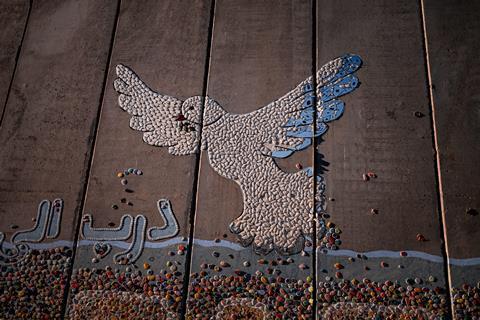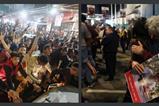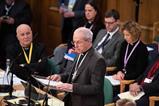Christian Aid are calling on the government to “immediately ban…all goods from illegal Israeli settlements.” It’s just one of many differing Christian responses to the conflict. Gavin Drake has the latest

Last week the International Court of Justice (ICJ) ruled that Israel’s occupation of the Palestinian West Bank is illegal. Many Christian organisations have responded to the ruling, and the escalating violence in the region, but have taken different approaches.
What is the ICJ and what has it decided?
The ICJ is an international legal body created by the UN for the peaceful settlement of international disputes. Only 74 of the UN’s 193 members recognise the court’s jurisdiction. Israel is one of the 119 UN member states which doesn’t recognise the ICJ’s jurisdiction.
Answering questions put to it by the UN General Assembly, the ICJ issued an 83-page, 285 clause advisory opinion “on the legal consequences arising from the policies and practices of Israel in the Occupied Palestinian Territory” (OPT). It said that Israel’s actions in the OPT makes its occupation of illegal. It specifically says that Israel’s creation of settlements in the OPT “actively contributes to the entrenchment of the occupation”.
Does Israel occupy Palestine?
In 1947, the UN General Assembly adopted the “Partition Plan for Palestine”, under which two new independent states, one Arab and one Jewish, would be recognised in land which was then controlled by the British. The State of Israel came into being on 14 May 1948. The following day four neighbouring states: Egypt, Syria, Transjordan and Iraq, invaded the new Israel, determined to, in the words of Sheikh Hassan el-Bana, head of the Moslem Brotherhood, “drive the Jews into the sea”.
Israel won the war. In doing so, they occupied land on the West Bank of the River Jordan, which, under the UN plan, should have been part of an Arab state. In the following decades, Israel’s neighbours launched repeated invasions. Each time Israel won, taking control of increasing parts of what should have been a Palestinian state.
Israel says this land is “disputed”, rather than “occupied.” But the rest of the world typically refers to “occupied territories” and proponents of a future two state solution tend to argue these territories should ultimately form a future Palestinian state.
What are settlements?
It is important to understand that “settlements” and “settlers” are Israeli outposts in the occupied territories and the people who live there. The use of these terms to talk about residents of Israel-proper is wrong.
The ICJ judgement says that, in 2023, there were approximately 465,000 settlers spread across 300 settlements in the West Bank.
Many of these are ultra-right wing Jews who believe that the whole land should be part of Israel. The creation of settlements alters the “facts on the ground” and, it is commonly argued, hampers negotiations for the creation of a future Palestinian state.
In some areas the settlements are constructed in a way that they effectively merge into Israel-proper, such as East Jerusalem. Israel claims East Jerusalem as its own, as part of an undivided capital city. But international law recognises this area as occupied. The ICJ report says that some 230,000 settlers live in East Jerusalem.
What is Christian Aid calling for?
Christian Aid wants the UK government to “get serious about the application of international humanitarian law without fear or favour” and “immediately ban from UK markets all goods from illegal Israeli settlements.”
Do other Christian groups support the call?
The executive committee of the World Council of Churches, at its meeting last month in Colombia, issued a “Statement on the Escalating Crisis in Gaza” in which they described the continuing “military attacks that produce appalling suffering for Palestinian people and communities throughout Gaza”. In it, they said: “In these circumstances, an arms embargo and economic sanctions must be considered as means to stop the bloodshed and destruction of Gaza.”
Do all churches support a call for sanctions against Israel?
No, plenty of churches take a different view. In the run up to the ICJ judgement, 800 Christians from over 40 nations gathered in The Hague to, in the words of the International Christian Embassy Jerusalem (ICEJ), “take a stand for Israel and its historic and biblical rights to the Jewish homeland.” The event was organised by Jack van der Tang, an evangelical minister. Christian Zionists like Tang are typically staunch defenders of the Israeli government. ICEJ are also concerned about what they call “very ominous developments”, including “antisemites marching in Western cities” (a reference to some Pro-Palestinian protests). They believe current events are linked to end times prophecies: “We are currently only one vote away in the UN Security Council from the nations forcing a dividing of the Land, including Jerusalem, in a way which could trigger the divine judgement of the nations warned of in Joel chapter 3.”
Pro-Israel Christians must strongly disagree with the World Council of Churches suggestion that the rest of the world impose sanctions on Israel.
Yes, but other Christians actually think that the WCC call doesn’t go far enough! The Christian Palestinian campaign group Kairos challenged the WCC’s use of the word “crisis” in the title as “neither accurate, nor adequate”. Instead, Kairos said that “The protracted ‘crisis’ is a result of eight months of Israel’s incessant large-scale military aggression which amounts to acts of genocide…It cannot be acceptable that crimes of such scale, committed deliberately over eight months, be narrowed down to a ‘crisis.’”
Is Kairos correct that Israel is perpetrating genocide?
In 1946, the UN defined genocide as “a denial of the right of existence of entire human groups”. We should be careful about using such a serious charge without evidence to back it up. No court or international body has said that Israel is perpetrating genocide.
And while the war in Gaza is an appalling humanitarian crisis, and its effects devastating, that, alone, is not sufficient to justify the term “genocide”.
Aren’t Hamas accused of being genocidal too?
Yes, some Christians have argued this. They have pointed to Hamas’ official charter, which defines its goal as “to raise the banner of Allah over every inch of Palestine” (Article 6) by “obliterating” Israel (Preamble). Their charter also quotes a widespread Hadith attributed to Muhammed: “The Day of Judgement will not come about until Muslims fight Jews and kill them. When the Jew will hide behind rocks and trees, the rocks and trees will cry out: ‘O Muslim, there is a Jew hiding behind me, come and kill him’” (Article 7). Given Hamas are pledging themselves to destroying the world’s only Jewish state, one can see why some have accused them of having a “genocidal ideology”.
Do Christian bodies invest in Israel?
The Church Commissioners manage the Church of England’s historic investment fund, valued at £10.5 billion. The Commissioner’s Alan Smith told the General Synod last month that “less than 0.11% of the fund” was invested directly in Israeli companies; and that all its holdings were subject to responsible investing policies.
The Presbyterian Church in the USA last month narrowly voted in favour of a $21 million USD divestment from Caterpillar, Hewlett-Packard and Motorola because of their operations in the occupied territories.
Do Palestinian Christians back a boycott?
There are differing views on divestments and boycotts. But Palestinian Christians are increasingly speaking with one voice, as the Patriarchs and Heads of Churches in Jerusalem. They have yet to respond to the ICJ judgment. But it is worth following their statements and joining with all believers in the land - Jews and Arabs alike - as they “pray for the peace of Jerusalem”.





































No comments yet